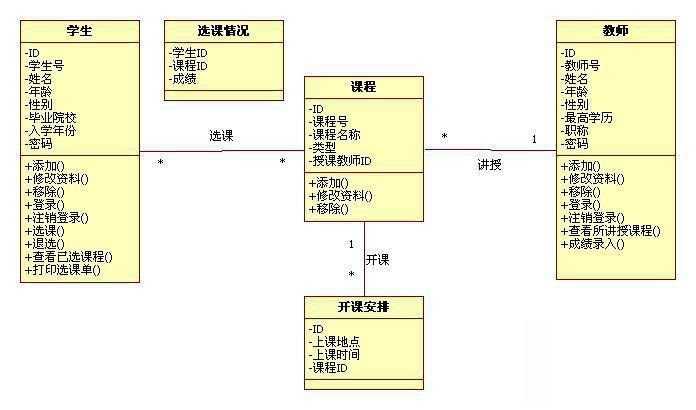标签:aci class padding documents dash 关系 面向对象设计 之间 说明
♦ 1) Collect application domain information
– focus on the functional requirements – also consider other requirements and documents
♦ 2) Brainstorming
– listing important application domain concepts – listing their properties/attributes – listing their relationships to each other
♦ 3) Classifying the domain concepts into:
– classes – attributes / attribute values – relationships
• association, inheritance, aggregation
♦ 4) Document result using UML class diagram
最终画出业务类图,并说明业务类图中每一个类、属性、方法的来源,对于有关联类Association Class的情况要进一步给出关系数据库的模型
一.领域建模:
从领域模型开始,我们就开始了面向对象的分析和设计过程,可以说,领域模型是完成从需求分析到面向对象设计的一座桥梁。
顾名思义,就是显示最重要的业务概念和它们之间关系,是真实世界各个事物的表示(现实世界的可视化抽象字典)而不是软件中各构件的表示。领域模型是描述业务领域(业务实体)的静态结构。
二.建立领域模型的好处:
1.通过建立领域模型能够从现实的问题域中找到最有代表性的概念对象。
2.并发现出其中的类和类之间的关系,因为所捕捉出的类是反馈问题域本质内容的信息。
三.领域建模的步骤
1)发现类和对象
2)建立类之间的联系
3)添加类的重要属性
四.项目领域建模UNL类图
|
类 |
属性 |
方法 |
|
学生 |
学生号,姓名,年龄,性别..... |
添加,修改,移除,登录,注销...... |
|
课程 |
课程号,类型,授课老师..... |
添加,修改,移除...... |
|
教师 |
教师号,姓名,年龄,学历...... |
添加,删除,移除,登录,注销....... |

标签:aci class padding documents dash 关系 面向对象设计 之间 说明
原文地址:https://www.cnblogs.com/hgsheng/p/11925089.html